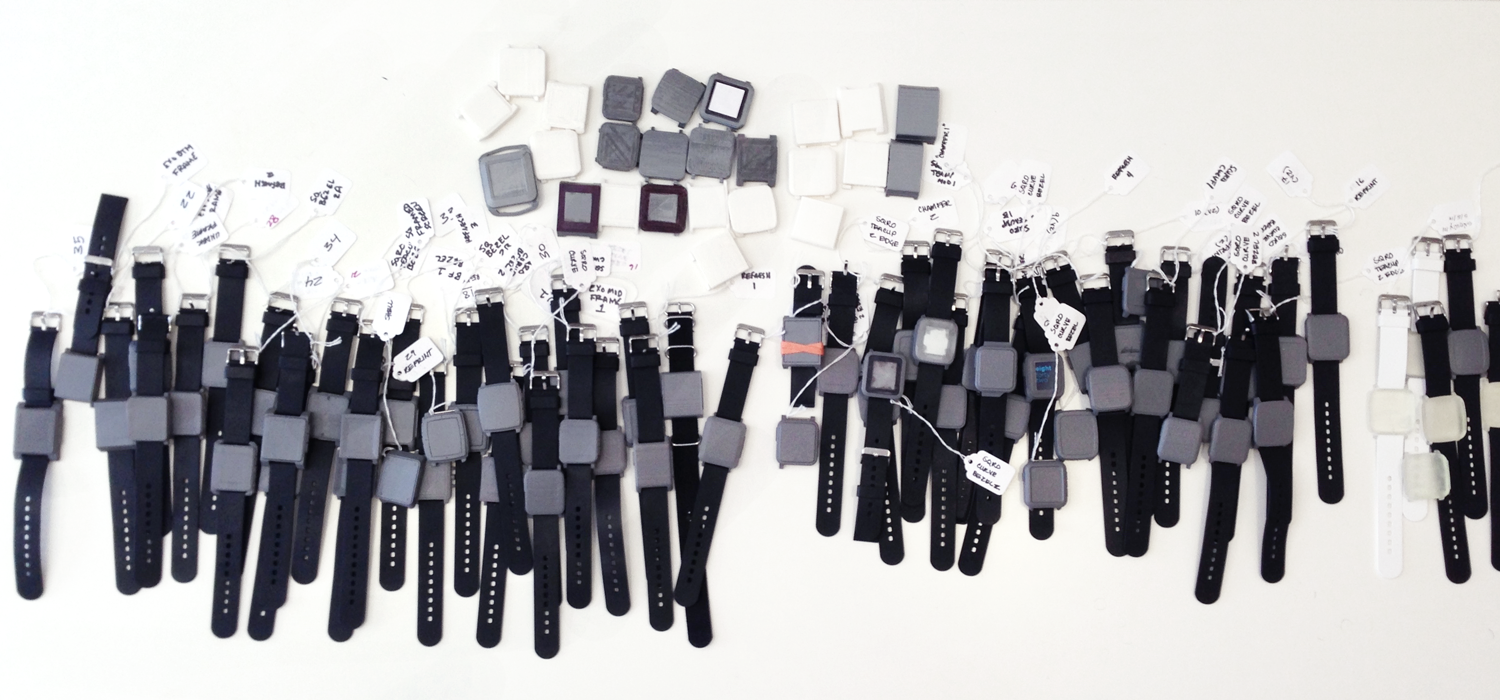Information from the original source about the death of Pebble
The CEO of the absurd manufacturer of smart watches explains what went wrong, and why Fitbit cut off his company

If you follow the mythology of Silicon Valley, then Eric Migikovsky should boil with indignation. After all, he failed. For the past nine years, he has spent time around the clock, and worked at Pebble, the smart watch company he started when he was 21 years old. Then the young Eric studied abroad, in the city of Delft in the Netherlands, famous for its greater consumption of marijuana than technology. His life path is truly legendary: not a particularly successful startup in Y Combinator, the hero of Kickstarter, the creator of his platform and the seller of more than two million smart watches. It looks cool, but it was not enough. Pebble was losing money, and there was no profit.
So on December 6, Migikovsky sold to digging, including all intellectual property, Fitbit, which promised to hire 40% of current Pebble employees. At the age of 30 he will be an adult for the first time, not having the title of general director. And in the culture that made the failure his fetish, he deserved the highest award: a broken and burned startup.
')
But he does not boil with indignation.
And does not cry, and does not cry. When I met this lanky, two-meter-long, bearded Canadian last week at a diner in Palo Alto, Migikovsky was still the same joyful and attentive guy I knew in more promising times, although our communication turned out to be unusually restrained. After all, we met on the day when the deal was closed with Fitbit.
Migikovsky agreed to meet with me because I kept the periodic chronicles of his company. I interviewed him at a time when it was a lonely iron startup in Y Combinator (then the company was called Alerta, and they were developing an InPulse watch). Over the past two years, our publication has called on it several times, and we have done a series of articles, "The Adventures of Pebble." I specifically went to him the next day after Apple announced its own smart watch. Migikovsky said Pebble would benefit from such recognition of wearable products. I saw an early version of a very cool Pebble Time Round model. And this year, I happily watched the expansion of the product line with an unscreened gadget, which should be hung on a key ring and transfer music, while assessing the quality of your run. And when we made an appointment, he voiced my thoughts: I will write about the latest Pebble adventure.
"In search of adventure" - this is how you can describe the current Pebble year. 2016 began in a crisis. The year before, the company, once profitable, went into the red zone, and met the second half of the year, without fulfilling the sales plan. Pebble was not destined to be profitable. In March 2016, Migikovski dismissed a quarter of 160 employees, almost at the same time as the company moved from the close loft in Palo Alto to a spacious sparkling office in the suburb of Redwood City. They are optimistic rented two floors, and now fit on one.
It turned out that Pebble - like Apple - had misjudged the wearable gadget market. The idea of wearing an iPhone on your wrist is not taken hold. The only cool application for wrist devices, apparently, is fitness. Active people like to use a gadget that reads biometrics and tracks activities. Apple’s focus on fashion, and Pebble on productivity and third-party innovation were expensive deviations. The market of smart watches is rooted in health and fitness. “We understood it too late, and Apple now understands this too,” says Migikovsky. He admits that notifications are perhaps the second key feature of smart watches. "We did not understand this in 2014 - if we then positioned ourselves as a smart watch for fitness, then maybe everything would be different."
In her favor, we say that Pebble quickly picked up the changes. This year, Pebble announced the products that focus on fitness, in particular, Pebble Core, the same gadget for the key ring. Note that the second generation Apple Watch is also aimed at fitness lovers . Pebble also introduced a new watch with optimization for health-related applications and pulse tracking. In April, the Kickstarter announcement raised over $ 12 million .
But all this came too late, and Pebble did not manage to collect sales that could save the company. Core has become a ghost product, a great prototype that 24,000 Kickstarter customers never get (they are promised money back).

But in April, Migikovsky did not tell me that the return of Pebble to Kickstarter for Core advertising was caused by the inability to find funding. “After the layoffs it was difficult to find the money. It was an inhibiting factor, ”he says now. “So we went to Kickstarter. After Kickstarter, we tried again to find funding, and it didn't work out for us. ”
In the spring and summer, Migikovsky tried everything to keep the company afloat, was particularly active in the summer, and then his attempts lost speed due to the unsuccessful holiday season. New products were delayed, the release schedule crawled in 2017. “In September, there was a real fever,” he says. “I flew all over the world, was in China, tried to sell OS licenses, talked with investors - and these were not the investors with whom you talk at other stages of a startup.” He did not visit the coolest venture investors, but private equity companies, family investment enterprises — companies that were outside the technical community.
He came up with different alternatives, even pondered over crowdsourcing financing. But because of the criticism for getting too frequent Kickstarter outputs, this option was discarded. Like other development options, including such a fireman, as “dismiss all but a dozen people, and see what happens.”
In October, Migikovsky made the final decision that Pebble drowned. It is time to sell what we have, leaving consumer protection a priority, supporting developers and doing everything we can for employees. Oddly enough, the turning point energized him and all the directors of the company. “When the decision was made in October, everything was straightforward,” he recalls. “We had a mission, and we had to sell the company.”
The best buyer was Fitbit, a leader in the manufacture of wearable devices for fitness, recently entered the market of smart watches.
Migikovsky says that at Fitbit he was attracted (despite the modest compensation, which Bloomberg Business Week valued at $ 40 million), the company's agreement not to get rid of Pebble developers and users. Although it is unclear how everything will turn out - will the Fitbit watch work on the Pebble OS in the future? - Migikovski makes it clear in his blog that the deal can expand the Pebble user database from two million to 50 million. "Fitbit is doing everything possible to support developers," says Migikovski.
Although all the details of the transaction were not disclosed, it is clear from the announcements on the companies' blogs that the transaction represents the sale of assets, including Pebble software, firmware, patents - but not iron itself or other physical assets. Pebble is responsible for its debts. A few Pebble employees, or, as they are called, peblers, will join Fitbit; most of them are engineers. Migikovsky confirmed that the rest will receive severance pay.
The Pebble watch will continue to tick, and Fitbit will continue to support the Pebble first, although the guarantee will no longer work. The creators of applications and addons can still sell them to a declining community of Pebble fans. Kickstarter products will be refunded to customers.
Fitbit has its own problems - last month they cut sales forecasts , and the value of stocks fell to a historic low - but the addition of Pebble’s experience with engineers and patents for some of their innovations may improve future Fitbit products. It's funny that last April Migikovsky brought Fitbit as an example of a company that, before others, realized that fitness would be the main function of a wearable watch, and worked with an emphasis on that. “They have a schedule for moving from health and fitness to a more versatile watch,” he told me. "We have the opposite situation, we started with a general-purpose clock, and we had to figure out that health is one of the topics that interest Pebble users." He, of course, did not suspect that Fitbit would try to make this transition using the remnants of his own company.
A press release from James Park, the CEO and co-founder of Fitbit, supports this theory: “While wearable electronics grows wiser, and smart watches add health and fitness opportunities, you see the opportunity to expand our leading position based on our strengths. in the category of wearable electronics.
Migikovsky will not work at Fitbit. He does not endorse or deny rumors about working at Y Combinator. In any case, he does not leave Pebble a rich man. “This is not such a deal,” he says. “It mainly concerns users, employees and salespeople.”
Regret?
“I would change a little,” he says. - Everything went wrong according to the plan, but it rarely happens at all. We tried. We created an excellent product, we released it, launched the market ... And we could not take the next step. ”
What about this mark of difference from Silicon Valley, known as failure? Migikovsky does not think that he is entitled to such a sign. “I didn’t follow the quick failure mantra,” he says of his nine-year Odyssey. But for him the purpose of this sale was to preserve - the possibility of continuing the cultivation of the community he built. “This is not a huge community, but I think that is quite large: two million people around the world,” he says.
As for me, Eric Migikovsky has achieved very much for his age, up to 30 years. And despite the sudden completion, Pebble was an innovative and expanding company that offered quality products to its users and a grateful community for developers. It was a breath of fresh air in the space where big companies are competing with grim and not always correct determination. He is only 30, and Migikovsky still has plenty of time for future glory. And full of hours left to track this time.
Source: https://habr.com/ru/post/372971/
All Articles